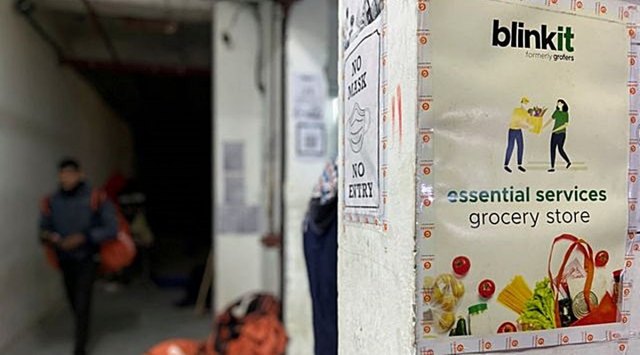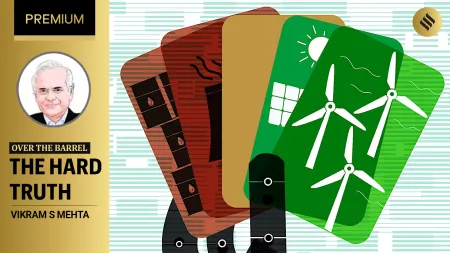- India
- International
Blinkit protests: For gig workers, there is no income security – and little legal recourse
By calling themselves 'intermediaries' platforms are reducing workers' incomes, increasing labour insecurity
 The Blinkit protests last week are a reminder of the kind of problems that are specific to gig-platform workers. (Reuters)
The Blinkit protests last week are a reminder of the kind of problems that are specific to gig-platform workers. (Reuters)
Blinkit delivery agents have been on strike for a week as a reaction to changes that will halve their monthly incomes. The protests started after the company changed the basis on which they will get paid, and how much they will get paid. These two factors: The calculation of “wages” and the actual sum of money earned have been at the heart of many gig worker protests over the years. Uber and Ola drivers have protested about big drops in their income over the years. The Blinkit protests last week are a reminder of the kind of problems that are specific to gig-platform workers. Gig-platform worker wages can be changed quickly, and are at the mercy of much larger forces in a platform company like Blinkit.
Despite being labelled self-employed independent contractors by companies, platform workers have little control over their terms of work. They have to get used to platforms dictating how much they earn per task if they want to work. But to change the entire structure of pay has made many workers feel defrauded and lied to. Until these changes, Blinkit used to pay workers through an assured base pay of Rs 25 with incentives on top that nudged workers to work more, faster, or on particular days. As per workers’ accounts, this allowed them to earn Rs 6,000 to 7,000 a week with a degree of certainty, with Rs 1,400 to 1,500 being spent on fuel and other expenses. The base pay had already been reduced last year from Rs 50 despite rising fuel costs and inflation driving up costs of survival. In the current instance of policy change, the company provided no prior information to workers that they would, now, be paid for each kilometre they drive. Platforms like to call this “effort”-based pay. The effort here is how far your motorcycle runs and has little to do with how much real effort it takes to complete a delivery. For Blinkit, which provides grocery delivery within a 2-km radius, the chance for workers to make a secure income is low. Their incomes also depend on the rate for each kilometre ridden. This rate always changes, but most delivery agents do not know when it will change. It can change at any given day or week, or time in the day so that there is no surety on how much a worker will take home any given week.
Incentive-driven payout structures have “gamified” platform work, such that workers are forced to compete for an increasing number of tasks within compressed periods with the promise of bonus pay. These structures are constantly shifting, with workers complaining that companies reduce their task allocations so they are unable to meet their incentives. This level of volatility and uncertainty is a hallmark of taxi and delivery platforms. It shakes any sense of knowing how a person can run their household, and pay for maintenance of bikes, internet and phone costs.
This volatility is encoded onto the platform since these businesses are run on a delicate balance of demand and supply. Blinkit’s job as a platform is to bring in “dark stores” (warehouses for products to be delivered after being ordered online) in line with what consumers want, to get consumers to order through Blinkit, and keep delivery agents around to fulfil those orders. This is why platforms call themselves intermediaries, or say they orchestrate demand and supply. This is the logic they use in reducing incomes. If a platform reduces incomes, fewer delivery agents are likely to sign on for the day, and the fewer people they have to pay. The job can immediately and instantly go. Platform business models thrive on the state of underemployment in urban India, with over 73 million young workers looking for work in cities. Platform work offers a route to survival for these young workers who migrate to metro cities for jobs, often with high levels of education and few other employment opportunities in the formal economy. In the long term, jobs in the platform economy have proven to be comparable to other jobs in the informal economy, offering low pay with little income security for workers.
Delivery agents and platforms communicate with each other through push notifications on the company app, SMS, or IVR calls, which have pre-recorded messages. Interaction with a human manager, or representative of the company is rare, causing delivery agents to have no one to reach out to when they feel unfairly treated. Platform workers globally have resorted to organised strikes, protests and public demonstrations, and even legal action to make their voices heard. Platforms do not react well to such protests—Blinkit arbitrarily shut down workers’ accounts with a message that they had been instigating protests, while Urban Company, another platform company, filed a legal suit against workers for participating in protests last year. These actions are in blatant contradiction to platforms’ claims that workers are self-employed and have complete flexibility and autonomy over their work. Little protection is available for delivery agents — the new Code on Social Security offers the chance of social security to workers but no assurances on wages, or legal recourse at moments when things go bad.

Surie works at Indian Institute for Human Settlements. Tandon is a non-resident fellow, Centre for Internet and Society
40 Years Ago
EXPRESS OPINION
More Explained
May 07: Latest News
- 01
- 02
- 03
- 04
- 05








































